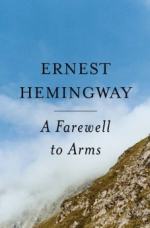|
|
A Farewell to Arms Topic Tracking: War
War 1: The war is a part of the landscape as well as an anomaly upon it. This book has very little combat, but it is filled with the effects of war. The town, Gorizia, functions normally even though there are people dying in and around it. More people die from diseases than in combat.
War 2: The war is involved in everything. Even when Fred and the others are eating dinner together and making fun of the priest, the war is always in the background.
War 3: Life goes on through the confusion of the war. Rinaldi and Fred chase women and carry on with their war duties simultaneously. Battles must be fought in the fairer weather and the winter is just about ending. Both sides are preparing for a renewed clash.
War 4: the real business of war starts and the men begin to reveal how they feel about it. The drivers paint the conflict in terms of class struggle. They have no wish to fight at all. The ugly part of war begins with the shelling and the shooting. Fred's legs are torn apart by an explosion that also kills one of his men.
War 5: Even though Fred has been taken away from the front, he is never really away from the war. His wound is a constant reminder of its carnage. The United States entering the war does not change his status, but it brings his country to the war he has been fighting for years.
War 6: Away from the front, where everyone is either a civilian or a soldier on leave, war is no longer a ruinous and painful experience. It has become a contest. Ettore Moretti is proud of his awards and accomplishments; wounds are a special kind of medal. Fred is impressed with Ettore, but Catherine finds him boring.
War 7: Since Fred's injury, the face of the war has changed. The officers are much less optimistic and their hearts have not been lightened by America's entrance to the war. War makes everyone tired.
War 8: The war takes on yet another face during a discussion between Fred and the priest. No longer is it merely a matter of who wins and loses. There is no longer winning or losing. Everyone has lost by being involved in the war. Ending it won't make it that much better.
War 9: Fighting turns into retreat. The Italians are afraid of the German troops in a way they never feared the Austrians. Fred learns the gruesome fact that the wounded must be left behind in the hills. It is hard to defend the mountains against the onslaught and the Italians must begin a multi-day retreat onto the plains.
War 10: The experience becomes more dismal as the retreat continues. Fred shoots at the engineers who are deserting and wounds one of them, ultimately killed by Bonello. There is no doubt that the drivers want nothing to do with the war. They continue to describe the war in terms of class struggles.
War 11: The retreat has plunged everyone into confusion. As soon as Fred realizes they have been outflanked by the enemy, one of his men is shot. Bonello runs off to be captured, as Fred and Piani sneak back into the Italian forces. Here, however, the Italian officers panic, interrogating and executing anyone who is not Italian. Fred must dive into the river to avoid getting shot.




